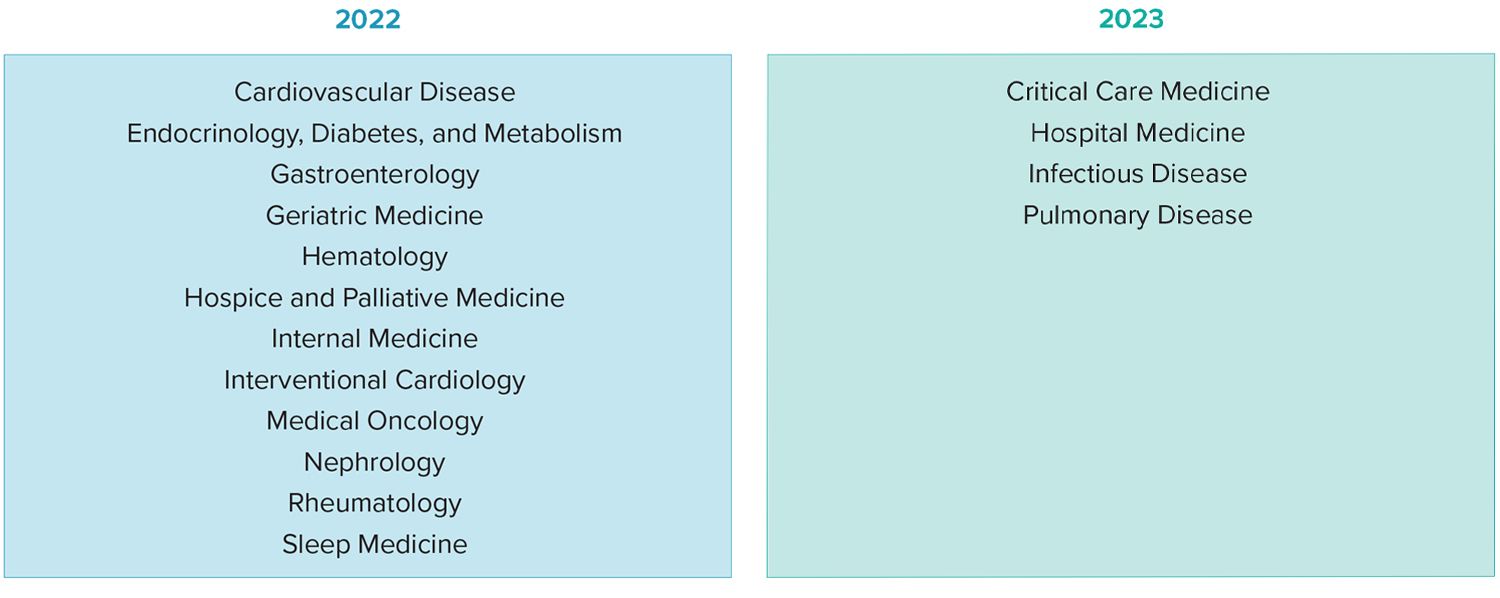Fall 2021 Pulmonary Disease Board Summary
November 2, 2021 | Posted by ABIM | ABIM Governance

Lynn T. Tanoue, MD, MBA, Chair
The Pulmonary Disease Board met virtually on October 1, 2021 to discuss recent and upcoming changes at ABIM, as well as many other important issues facing the discipline.
Below is a summary of the key takeaways from the meeting:
Leadership Update
Richard J. Baron, MD, ABIM President and CEO, joined the Pulmonary Disease Board to provide members with recent updates, including:
- Reflecting on the spring 2021 Internal Medicine Summit, and how ABIM and specialty societies could collaborate to advance diversity, equity and inclusion (DEI) efforts across internal medicine.
- Sharing reactions to a joint statement issued by ABIM, the American Board of Family Medicine (ABFM), and the American Board of Pediatrics (ABP) cautioning physicians about disseminating misinformation on COVID-19.
- Previewing the Longitudinal Knowledge Assessment (LKA), slated to launch in January 2022 in 12 specialties and in 2023 in Pulmonary Disease.
Procedural Requirements for Pulmonary Disease and Critical Care Medicine Initial Certification
In order to be eligible for ABIM certification in pulmonary disease and/or critical care medicine, physicians must fulfill specified training and procedural competency requirements. ABIM has recently received a request from the Association of Pulmonary Critical Care Program Directors (APCCMPD) requesting that pulmonary artery catheterization (PAC) be removed from the list of required procedural competencies for dual certification in pulmonary disease and critical care medicine.
Pulmonary Disease Board members engaged in a discussion about the relevance of the current list of procedure requirements, suggesting the potential inclusion of other procedures.
Before any change is made, ABIM will reach out to the pulmonary/critical care medicine community to learn about their opinions on the current list of procedural competencies. Specialty Board members suggested additional stakeholder groups to be consulted, such as patient groups and specialty societies.
Feedback from the Critical Care Medicine Board will also be obtained, and as a next step ABIM research staff will use feedback from both Specialty Boards to develop a survey for all pulmonary disease and critical care medicine diplomates about how frequently they perform the currently required procedures in practice. Stakeholder feedback will also be shared with program directors for their input, with all findings presented to the Pulmonary Disease and Critical Care Medicine Boards for a final decision on what the procedural requirements for initial certification should be going forward.
Approval of Specialty Board Members for Selection by the ABIM Council
The Pulmonary Disease Board reviewed candidates for open positions and recommended two to the ABIM Council for consideration. Members were encouraged to take into account the overall composition of the Pulmonary Disease Board with respect to practice setting and demographic representation, along with candidates’ prior experience and reasons for wanting to serve on the Pulmonary Disease Board.
The ABIM Council will review the Pulmonary Disease Board’s recommendations and make final selections. Candidates will be notified by spring 2022 and all new Governance members will be announced in July 2022.
Diversity, Equity and Inclusion: Progress Report
Pamela Browner White, Senior Vice President of Communications and Chief Diversity, Equity and Inclusion Officer; Lorna Lynn, MD, Vice President for Medical Education Research and the Staff Administrator for the Board of Director’s Committee on Diversity, Equity and Inclusion; and Weifeng Weng, PhD, Director of Research Analysis, updated the Pulmonary Disease Board on ABIM’s progress in advancing DEI and becoming an actively anti-racist organization.
Ms. Browner White noted that she has been Chief Equity, Diversity and Inclusion Officer for a little more than a year at the time of the meeting, and encouraged Specialty Board members to visit the year in review post on the ABIM blog.
She also reminded the Specialty Board of ABIM and ABIM Foundation’s Racial Justice statement: “It’s not simply enough to say passively we will do no harm; we pledge actively to do our part in opposing and dismantling systems and policies that cause harm to our patients and disproportionately affect those in Black and Brown communities.”
She said much of the work has been guided by this statement, and updated members in a number of areas ABIM is making progress.
Dr. Lynn and Dr. Weng then provided an overview of race and ethnicity data for the overall internal medicine diplomate population and for pulmonary disease diplomates. Dr. Lynn noted that while the current reports rely on external data, in the future, ABIM will ask diplomates to self-identify with regards to their gender, race and ethnicity.
ABIM will collaborate with society partners and others to decide on what identifiers will be used. Making the reasons clear as to why we will begin to the collect this information is vitally important; it’s all about assuring that our programs are fair, and that we make sure a broad range of voices are included in our discussions.
Pulmonary Disease Board members shared their reactions to these data and their ideas for how ABIM can best move this work forward, as well as their personal experiences working within their own institutions.
As ABIM continues this work it will keep the community informed on its progress. More information can be found in a special section of our blog entitled ABIM’s Commitment to Health Equity.
Longitudinal Knowledge Assessment (LKATM) Update
Alison Carey, Senior Director of Engagement and Digital Experience, gave the Specialty Board a preview of the Longitudinal Knowledge Assessment (LKA) Platform and updated them about how ABIM has engaged physicians throughout the development process to ensure it will meet their needs and provide a good user experience.
The engagement work included establishing a Physician Advisory Panel of 10 board certified physicians, who met on a monthly basis to share feedback on a variety of areas, such as the LKA assessment platform, communications materials, and other program design elements.
The Panel’s insights were enhanced through regular user-testing sessions, additional physician interviews, surveys and feedback gleaned from diplomate phone calls and emails. In addition, in August 2021, 26 physicians volunteered to serve as beta testers for the LKA platform to help identify bugs and any user experience issues; their feedback resulted in important improvements to the assessment platform prior to launch.
All of this physician feedback also helped generate a comprehensive LKA Physician Journey, outlining physician opportunities and challenges. Some of the top challenges were discussed during the meeting to help prepare members in case colleagues approach them with questions.
For example, one challenge identified was that enrolling and participating at the beginning of a physician’s assessment due year is a departure from how many diplomates engage with MOC, and may not be intuitive. To address this challenge, ABIM will communicate clearly through multiple channels, including emails, social media, its website and more to ensure physicians are informed about this new process.
Pulmonary Disease Board Members also shared concerns about the number of questions someone would need to answer if they participated in the LKA for more than one certificate, and learned that staff are exploring ways to realize efficiencies for aligned disciplines in the future that could reduce the number of questions needed. It was also recognized that diplomates often have assessments due in different years, and for some they may decide to mix and match by choosing LKA in one discipline and the traditional, 10-year MOC exam in another.
ABIM plans to continue engaging with the community beyond the LKA launch and make improvements based upon physician feedback. All ABIM Board Certified physicians are encouraged to join the Community Insights Network where they may receive occasional requests to share their thoughts about various ABIM programs or topics.
Enrollment for the 2022 LKA opens December 1, 2021 for 12 disciplines, and the first batch of questions will be delivered January 4, 2022. As a reminder, the LKA will launch in 2023 for Pulmonary Disease. Learn more about LKA’s features, benefits, and other important details at abim.org/lka.
LKA Rollout Schedule

Exploring Opportunities to Enhance Trust Between ABIM and the Community
In an effort to continually improve its programs and relationships with the diplomate community, Specialty Board members engaged in an exercise aimed at identifying opportunities to enhance trust between ABIM and the physicians it serves. Insights previously gleaned through Governance member feedback have informed other important changes at ABIM, including advancing DEI initiatives, better accommodations for nursing mothers, and the LKA launching in 2022.
A number of ideas emerged during this session, such as ensuring diplomate feedback is incorporated into all programmatic decisions, and increasing the frequency of communications about MOC. Specialty Board members also suggested new videos could be created about various aspects of ABIM’s programs, and that wherever possible communications should be personalized to the individual physician.
Similar sessions are being held at each ABIM Specialty Board meeting throughout the fall. The top ideas will be presented to the ABIM Council for further consideration of future implementation.
In Closing
The Pulmonary Disease Board values the feedback and commentary of the entire medical community, including diplomates and society partners.
Do you have any questions? Are you interested in how to get involved?
If you have questions after reading this report, please connect with us through the following channels:
- Subscribe to the ABIM blog
- Call:1-800-441-ABIM (2246)
- Email: request@abim.org
- Join our Governance to help guide our future direction
- Join our Community Insights Network to share your feedback.



